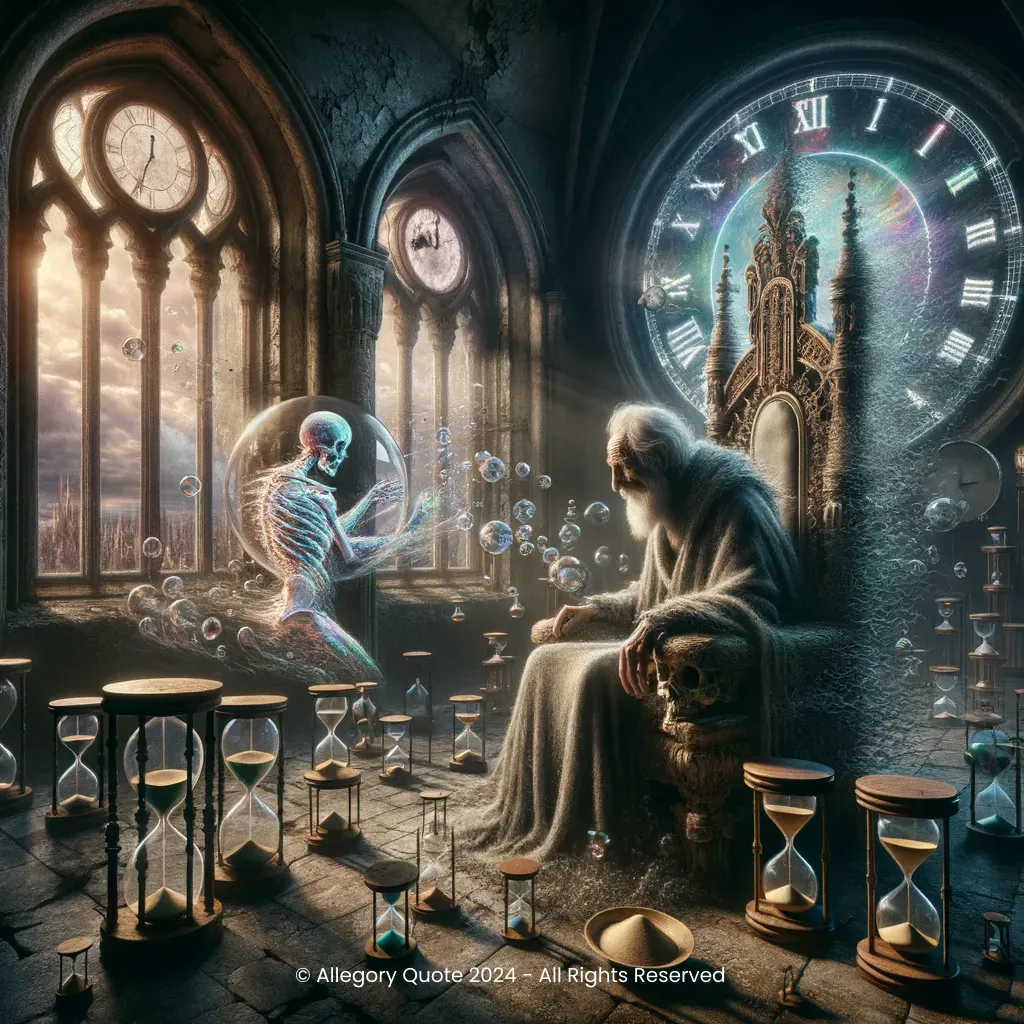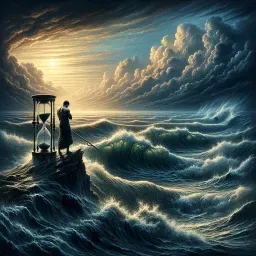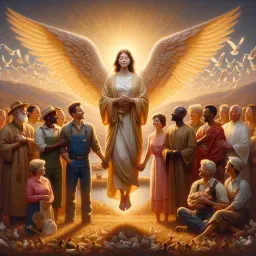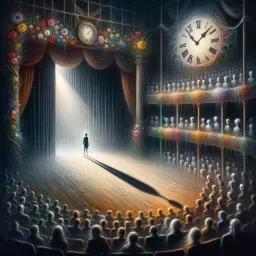I wasted time, and now doth time waste me

- Meaning
- This phrase encapsulates a profound reflection on the consequences of procrastination and the inexorable passage of time. It conveys a sense of regret and the realization that time, once squandered, can lead to one's own decline and suffering. The speaker laments having wasted time in the past, which now comes back to haunt him as he perceives time as an active force that is now wasting him, underscoring the relentless nature of time and the inevitability of its effects.
- Allegory
- The image elements include: - The old, regal king on a crumbling throne: Represents the main character's downfall and regret over wasted time. - Hourglasses and clock faces: Symbols of the passage of time. - The king gazing at an hourglass: Emphasizes his realization and lamentation over wasted time. - The ghostly younger version of the king: Symbolizes lost potential and missed opportunities. - Vibrant world outside the windows: Represents opportunities and life that the king can no longer reach. - Interplay of light and shadow, and the decaying surroundings: Create a contrast between past possibilities and current regrets, capturing the emotional and conceptual depth of the phrase.
- Applicability
- In personal life, this phrase serves as a powerful reminder to value time and make the most of it. It encourages individuals to seize opportunities, act decisively, and avoid procrastination. Understanding that time is a finite resource can inspire proactive behavior, goal-setting, and the pursuit of meaningful activities, ultimately leading to a more fulfilling and purposeful life.
- Impact
- This phrase from "Richard II" has had a lasting impact on literature and culture. It is often cited in discussions about the nature of time, regret, and the human condition. The quote has been referenced in various contexts, including literary analyses, motivational speeches, and even popular culture, highlighting its timeless relevance and evocative power. The wisdom encapsulated in this line continues to resonate with audiences, prompting reflections on how individuals manage and value their time.
- Historical Context
- The historical context of this phrase lies in the late 16th century when Shakespeare wrote "Richard II," circa 1595. During this period, England was witnessing the Tudor dynasty, with Queen Elizabeth I on the throne. The play reflects themes of kingship, the divine right of kings, and the political instability of the time. It also addresses personal introspection and the consequences of leadership decisions.
- Criticisms
- There are few criticisms or controversies directly related to this particular phrase. However, some interpretations might challenge the deterministic view it seems to present about time and regret. Critics could argue that while the lament of time wasted is powerful, it should not overshadow the possibility of redemption and making amends in the present and future.
- Variations
- This phrase doesn't have direct variations but is often interpreted through different cultural lenses. For example, many cultures emphasize the importance of living in the moment and avoiding procrastination, echoing similar sentiments on the value of time. In Eastern philosophies, such as Buddhism, there is a recognition of impermanence, which aligns with the underlying message that time should not be wasted.
-

The empty vessel makes the loudest sound.
-

Give sorrow words; the grief that does not speak knits up the o-er wrought heart and bids it break.
-

I have always done my duty. I am ready to die. My only regret is for the friends I leave behind me.
-

Come what come may, time and the hour runs through the roughest day.
-

The quality of mercy is not strain'd, it droppeth as the gentle rain from heaven upon the place beneath.
-

Words, words, mere words, no matter from the heart.
-

Though she be but little, she is fierce!
-

How sharper than a serpent's tooth it is to have a thankless child!
-

Love all, trust a few, do wrong to none.
-

Life's but a walking shadow, a poor player that struts and frets his hour upon the stage and then is heard no more.
-

They stumble that run fast.
-

What light through yonder window breaks?
No Comments